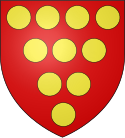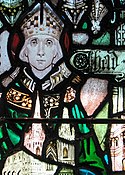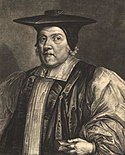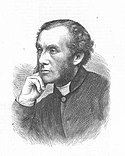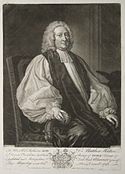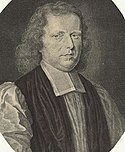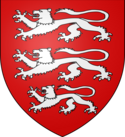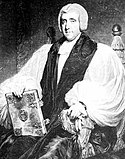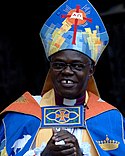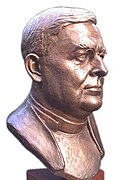Liste der Erzbischöfe von York
Die folgenden Personen waren Bischöfe und Erzbischöfe von York, bis 1559 gehörten sie der Römisch-katholischen Kirche an, danach der Church of England:
| Bischöfe von York | |||
|---|---|---|---|
| Name (Lebensdaten)[1] | Amtszeit | Anmerkung | Bild |
| Paulinus (Hl.) † 10. Oktober 644 | 625 bis 633 | danach Bischof von Rochester | (c) Polylerus, CC BY-SA 3.0 |
| Vakant | |||
| Ceadda (Hl.) † 2. März 672 | 664 bis 669 | danach Bischof von Lichfield |  |
| Wilfrith I. (Hl.)[2] † um 709 | 664 bis 678 | danach Bischof von Selsey | |
| Bosa (Hl.) † 9. März 705 | 678 bis 686 | ||
| Wilfrith I. (Hl.)[2] † um 709 | 686 bis 691 | danach Bischof von Leicester | |
| Bosa (Hl.) † 9. März 705 | 691 bis 705 | ||
| John von Beverley (Hl.) † 7. Mai 721 | 705 bis 718 | davor Bischof von Hexham; er trat von seinem Amt zurück | |
| Wilfrith II.[2] † 29. April 745/746[3] | 718 bis 732 | ||
| Erzbischöfe von York | |||
| Name (Lebensdaten)[1] | Amtszeit | Anmerkung | Bild |
| Ecgbeorht † 19. November 766 | 732/735 bis 766 | 735 wurde das Bistum York zum Erzbistum erhoben durch Papst Gregor III. | |
| Æthelbeorth † 8. November 780 | 767 bis 780 | ||
| Eanbald I.[2][4] † 10. August 796 | 780 bis 796 | ||
| Eanbald II.[4] † nach 808 | 796 bis nach 808 |  | |
| Wulfsige † zwischen 830 und 837 | (nach) 808 bis 830/837 | ||
| Wigmund † 854 | 837 bis 854 |  | |
| Wulfhere † um 900 | 854 bis 900 | ||
| Æthelbeald † zwischen 904 und 928 | 900 bis 904/928 | ||
| Hrotheweard † 931 | 904/928 bis 931 | ||
| Wulfstan I.[2] † 26. Dezember 956 | 931 bis 956 | ||
| Oskytel † 1. November 971 | 956 bis 971 | davor Bischof von Dorchester | |
| Edwaldus | 971 | er regierte nur 9 Monate. | |
| Osweald † 29. Februar 992 | 972 bis 992 | davor Bischof von Worcester; wahrscheinlich behielt er das Amt bei |  |
| Ealdwulf † 1002 | 992 bis 1002 | war gleichzeitig Bischof von Worcester | |
| Wulfstan II.[2][5] † 1023 | 1003 bis 1023 | war gleichzeitig Bischof von Worcester bis 1016 | |
| Ælfric Puttoc † 22. Januar 1051 | 1023 bis 1041 | das Amt des Bischofs wurde ihm 1040 entzogen, danach Bischof von Worcester | |
| Æthelric | 1041 bis 1042 | ||
| Ælfric Puttoc † 22. Januar 1051 | 1042 bis 1051 | wieder eingesetzt; davor Bischof von Worcester | |
| Cynesige † 22. Januar 1060 | 1051 bis 1060 | ||
| Ealdred † 11. September 1069 | 1060 bis 1069 | davor Bischof von Hereford und bis 1062 gleichzeitig Bischof von Worcester | |
| Thomas I. von Bayeux[2][6] † 18. November 1100 | 1070 bis 1100 | ||
| Gerard von Rouen † 21. Mai 1108 | 1100 bis 1108 | davor Lordkanzler und Bischof von Hereford | |
| Thomas II.[2][7] † 24. Februar 1114 | 1109 bis 1114 | ||
| Thurstan † 6. Februar 1140 | 1119 bis 1140 | er trat kurz vor seinem Tod zurück und in ein Kloster ein | |
| William Fitzherbert[8] † 8. Juni 1154 | 1143 bis 1147 |  | |
| Henry Murdac[9] † 14. Oktober 1153 | 1147 bis 1153 | ||
| William Fitzherbert[8] † 8. Juni 1154 | 1153 bis 1154 |  | |
| Roger de Pont l'Évêque[10] † 22. oder 26. November 1181 | 1154 bis 1181 | ||
| Geoffrey † um 18. Dezember 1212 | 1189 bis 1212 | davor Lordkanzler und bis 1181 Bischof von Lincoln |  |
| Simon Langton[11] † 1248 | 1215 | gewählt im Juni 1215, aufgehoben von Papst Innozenz III. im August 1215 | |
| Walter de Grey † 1. Mai 1255 | 1216 bis 1255 | davor Lordkanzler und Bischof von Worcester |  |
| Sewal de Bovill[12] † 10. Mai 1258 | 1256 bis 1258 |  | |
| Godfrey de Ludham[13] † 12. Januar 1265 | 1258 bis 1265 |  | |
| William Langton[14] † 15. Juli 1279 | 1265 | gewählt im März 1265, aufgehoben von Papst Clemens IV. im November 1265 | |
| St. Bonaventura † 15. Juli 1274 | 1265 bis 1266 | Gewählt, aber nicht geweiht, trat im Oktober 1266 von seinem Amt zurück |  |
| Walter Giffard[15] † um 25. April 1279 | 1266 bis 1279 | davor Lordkanzler und Bischof von Bath und Wells |  |
| William of Wickwane[16] † um 27. August 1285 | 1279 bis 1285 | ||
| John le Romeyn[17] † 11. März 1296 | 1286 bis 1296 | ||
| Henry of Newark[18] † 15. August 1299 | 1296 bis 1299 | ||
| Thomas of Corbridge[19] † 22. September 1304 | 1300 bis 1304 | ||
| William Greenfield[20] † 6. Dezember 1315 | 1306 bis 1315 | war davor Lordkanzler | |
| William Melton † 5. April 1340 | 1317 bis 1340 | war vorher Lordsiegelbewahrer und währenddessen zweimal Schatzkanzler |  |
| William Zouche[21] † 19. Juli 1352 | 1342 bis 1352 | war vorher Lordsiegelbewahrer und zweimal Schatzkanzler |  |
| John Thoresby[22] † 6. November 1373 | 1353 bis 1373 | war Lordkanzler und Lordsiegelbewahrer, sowie Bischof von St. Davids und Worcester | |
| Alexander Neville[23] † Mai 1392[24] | 1374 bis 1388 | war danach Bischof von St. Andrews |  |
| Thomas Arundel[25] † 19. Februar 1414[26] | 1388 bis 1396 | davor Bischof von Ely und danach Erzbischof von Canterbury, sowie mehrmals Lordkanzler |  |
| Robert Waldby[27] † 6. Januar 1398 | 1397 bis 1398 | davor Bischof von Chichester | |
| Richard le Scrope[28] † 8. Juni 1405 | 1398 bis 1405 | davor Bischof von Lichfield |  |
| Thomas Langley[29] † 20. November 1437 | 1405 bis 1406 | gewählt im August 1405, aufgehoben von Papst Innozenz VII. im Mai 1406; vorher Lordsiegelbewahrer, danach Fürstbischof von Durham und Lordkanzler | |
| Robert Hallam † 4. September 1417[30] | 1406 bis 1407 | danach Bischof von Salisbury | |
| Henry Bowet[31] † 20. Oktober 1423 | 1407 bis 1423 | davor Bischof von Bath und Wells | |
| Philip Morgan[32] † 25. Oktober 1435[33] | 1423 bis 1424 | gewählt, aber wieder aufgehoben | |
| Richard Fleming[34] † 25. Januar 1431[35] | 1424 bis 1425 | er gab nach seiner Wahl das Amt wieder ab und kehrte auf den Posten des Bischofs von Lincoln zurück |  |
| John Kemp † 22. März 1454[26] | 1426 bis 1452 | davor Bischof von London, danach Erzbischof von Canterbury |  |
| William Booth † 12. September 1464 | 1452 bis 1464 | davor Bischof von Lichfield |  |
| George Neville † 8. Juni 1476 | 1465 bis 1476 | Lordkanzler; davor Bischof von Exeter |  |
| Laurence Booth[36] † 19. Mai 1480 | 1476 bis 1480 | davor Lordkanzler und Fürstbischof von Durham |  |
| Thomas Rotherham[37] † 29. Mai 1500 | 1480 bis 1500 | davor Bischof von Lincoln, Lordkanzler und Lordsiegelbewahrer |  |
| Thomas Savage[38] † 3. September 1507 | 1501 bis 1507 | davor Bischof von London |  |
| Christopher Bainbridge[39] † 14. Juli 1514 | 1508 bis 1514 | davor Fürstbischof von Durham | |
| Thomas Wolsey † 29. November 1530 | 1514 bis 1530 | davor Bischof von Lincoln, gleichzeitig Lordkanzler, sowie Bischof von Bath und Wells und Winchester, Fürstbischof von Durham |  |
| Edward Lee[40] † 13. September 1544 | 1531 bis 1544 | ||
| Robert Holgate † 15. November 1555 | 1545 bis 1554 | von Papst Paul III. nicht als Erzbischof anerkannt, erster Anglikanischer Bischof; davor Bischof von Llandaff |  |
| Nicholas Heath † 1579 | 1555 bis 1559 | der letzte römisch-katholische Erzbischof, der vom Papst ernannt wurde |  |
| Thomas Young † 26. Juni 1568 | 1561 bis 1568 | davor Bischof von St. Davids | |
| Edmund Grindal † 6. Juli 1583 | 1570 bis 1576 | davor Bischof von London, danach Erzbischof von Canterbury |  |
| Edwin Sandys † 10. Juli 1588 | 1577 bis 1588 | davor Bischof von London |  |
| John Piers[41] † 28. September 1594 | 1589 bis 1594 | davor Bischof von Salisbury | |
| Matthew Hutton[42] † 15. Januar 1606 | 1595 bis 1606 | davor Fürstbischof von Durham |  |
| Tobias Matthew † 29. Mai 1628 | 1606 bis 1628 | davor Fürstbischof von Durham |  |
| George Montaigne[43] † 6. November 1628 | 1628 | davor Fürstbischof von Durham |  |
| Samuel Harsnett[44] † 25. Mai 1631 | 1629 bis 1631 | davor Bischof von Norwich | 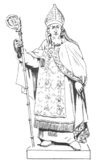 |
| Richard Neile † 31. Oktober 1640 | 1632 bis 1640 | davor Bischof von Winchester | |
| John Williams[45] † 25. März 1650 | 1641 bis 1650 | davor Bischof von Lincoln |  |
| Accepted Frewen[46] † 28. März 1664 | 1660 bis 1664 | davor Bischof von Lichfield | |
| Richard Sterne[47] † 18. Juni 1683 | 1664 bis 1683 | davor Bischof von Carlisle |  |
| John Dolben[48] † 11. April 1686 | 1683 bis 1686 | davor Bischof von Rochester | |
| Vakant | |||
| Thomas Lamplugh † 5. Mai 1691 | 1688 bis 1691 | davor Bischof von Exeter |  |
| John Sharp[49] † 2. Februar 1714 | 1691 bis 1714 |  | |
| Sir William Dawes[50] † 30. April 1724 | 1714 bis 1724 | davor Bischof von Chester | |
| Lancelot Blackburne † 23. März 1743 | 1724 bis 1743 | davor Bischof von Exeter |  |
| Thomas Herring[51] † 13. März 1757[52] | 1743 bis 1747 | davor Bischof von Bangor; danach Erzbischof von Canterbury |  |
| Matthew Hutton[53] † 19. März 1758[52] | 1747 bis 1757 | davor Bischof von Bangor, danach Erzbischof von Canterbury |  |
| John Gilbert[54] † 9. August 1761 | 1757 bis 1761 | davor Bischof von Salisbury | |
| Robert Hay-Drummond[55] † 10. Dezember 1776 | 1761 bis 1776 | davor Bischof von Salisbury |  |
| William Markham † 3. November 1807 | 1777 bis 1807 | davor Bischof von Chester |  |
| Edward Harcourt † 5. November 1847 | 1808 bis 1847 | davor Bischof von Carlisle |  |
| Thomas Musgrave † 4. Mai 1860 | 1847 bis 1860 | davor Bischof von Hereford |  |
| Charles Thomas Longley † 28. Oktober 1868[52] | 1860 bis 1862 | davor Bischof von Durham, danach Erzbischof von Canterbury |  |
| William Thomson[56] † 25. Dezember 1890 | 1862 bis 1890 |  | |
| William Connor Magee † 5. Mai 1891 | 1891 | davor Bischof von Peterborough |  |
| William Dalrymple Maclagan † 19. September 1910 | 1891 bis 1908 | davor Bischof von Lichfield; zurückgetreten am 31. Dezember 1908 |  |
| Cosmo Gordon Lang † 5. Dezember 1945[52] | 1909 bis 1928 | danach Erzbischof von Canterbury |  |
| William Temple † 26. Oktober 1944[52] | 1929 bis 1942 | danach Erzbischof von Canterbury |  |
| Cyril Forster Garbett † 31. Dezember 1955 | 1942 bis 1955 | davor Bischof von Winchester | |
| Arthur Michael Ramsey † 23. April 1988 | 1956 bis 1961 | davor Bischof von Durham, danach Erzbischof von Canterbury |  |
| Frederick Donald Coggan † 17. Mai 2000 | 1961 bis 1974 | davor Bischof von Bradford, danach Erzbischof von Canterbury | |
| Stuart Yarworth Blanch † 3. Juni 1994 | 1975 bis 1983 | davor Bischof von Liverpool | |
| John Stapylton Habgood | 1983 bis 1995 | davor Bischof von Durham |  |
| David Hope | 1995 bis 2005 | davor Bischof von London | |
| John Sentamu | 2005 bis 2020 | der erste afrikanischstämmige Erzbischof der Church of England; davor Bischof von Birmingham |  |
| Stephen Cottrell | ab 2020 | ernannt, Amtsantritt im Juni 2020[57] |  |
Einzelnachweise
- ↑ a b Wenn nicht anderes angegeben finden sich die Belege hierfür bei: Powicke & Fryde: Handbook of British Chronology. Second Edition, London 1961, S. 263 bis 266.
- ↑ a b c d e f g h Die Nummerierung erfolgt nur, um gleichnamige Bischöfe voneinander besser zu unterscheiden. Sie ist kein Bestandteil der Namen.
- ↑ Michael Lapidge: Wilfrid II. In: Lapidge et al. (Hrsg.): The Blackwell Encyclopaedia of Anglo-Saxon England. Wiley-Blackwell, Oxford u. a. 2001, ISBN 978-0-631-22492-1, S. 476.
- ↑ a b Personendaten in Catholic Encyclopedia (1913) (englisch).
- ↑ Kurzbiografie in Dictionary of National Biography, 1885–1900 (englisch).
- ↑ Kurzbiografie ( vom 9. August 2011 im Internet Archive) auf british-history.ac.uk (englisch).
- ↑ Kurzbiografie ( vom 9. August 2011 im Internet Archive) auf british-history.ac.uk (englisch).
- ↑ a b Kurzbiografie ( vom 9. August 2011 im Internet Archive) auf british-history.ac.uk (englisch).
- ↑ Kurzbiografie ( vom 9. August 2011 im Internet Archive) auf british-history.ac.uk (englisch).
- ↑ Kurzbiografie ( vom 9. August 2011 im Internet Archive) auf british-history.ac.uk (englisch).
- ↑ Kurzbiografie in Dictionary of National Biography, 1885–1900 (englisch).
- ↑ Kurzbiografie ( vom 9. August 2011 im Internet Archive) auf british-history.ac.uk (englisch).
- ↑ Kurzbiografie ( vom 9. August 2011 im Internet Archive) auf british-history.ac.uk (englisch).
- ↑ Kurzbiografie ( vom 22. Juni 2011 im Internet Archive) auf british-history.ac.uk (englisch).
- ↑ Kurzbiografie ( vom 9. August 2011 im Internet Archive) auf british-history.ac.uk (englisch).
- ↑ Kurzbiografie ( vom 9. August 2011 im Internet Archive) auf british-history.ac.uk (englisch).
- ↑ Kurzbiografie ( vom 9. August 2011 im Internet Archive) auf british-history.ac.uk (englisch).
- ↑ Kurzbiografie ( vom 9. August 2011 im Internet Archive) auf british-history.ac.uk (englisch).
- ↑ Kurzbiografie ( vom 9. August 2011 im Internet Archive) auf british-history.ac.uk (englisch).
- ↑ Kurzbiografie in Dictionary of National Biography, 1885–1900 (englisch).
- ↑ Kurzbiografie in Dictionary of National Biography, 1885–1900 (englisch).
- ↑ Thoresby, John. In: Salvador Miranda: The Cardinals of the Holy Roman Church. (Website der Florida International University, englisch), abgerufen am 20. Juli 2016. (englisch).
- ↑ Kurzbiografie in Dictionary of National Biography, 1885–1900 (englisch).
- ↑ Powicke & Fryde: Handbook of British Chronology. Second Edition, London 1961, S. 300.
- ↑ Kurzbiografie in Dictionary of National Biography, 1885–1900 (englisch).
- ↑ a b Powicke & Fryde: Handbook of British Chronology. Second Edition, London 1961, S. 211.
- ↑ Kurzbiografie in Dictionary of National Biography, 1885–1900 (englisch).
- ↑ Kurzbiografie in Dictionary of National Biography, 1885–1900 (englisch).
- ↑ Langley, Thomas. In: Salvador Miranda: The Cardinals of the Holy Roman Church. (Website der Florida International University, englisch), abgerufen am 20. Juli 2016. (englisch).
- ↑ Powicke & Fryde: Handbook of British Chronology. Second Edition, London 1961, S. 251.
- ↑ Kurzbiografie in Dictionary of National Biography, 1885–1900 (englisch).
- ↑ Kurzbiografie auf www.yba.llgc.org.uk (englisch)
- ↑ Powicke & Fryde: Handbook of British Chronology. Second Edition, London 1961, S. 224.
- ↑ Kurzbiografie in Dictionary of National Biography, 1885–1900 (englisch).
- ↑ Powicke & Fryde: Handbook of British Chronology. Second Edition, London 1961, S. 236.
- ↑ Booth, Laurence. In: John Venn, John Archibald Venn (Hrsg.): Alumni Cantabrigienses. A Biographical List of All Known Students, Graduates and Holders of Office at the University of Cambridge, from the Earliest Times to 1900. Teil 1: From the earliest times to 1751, Band 1: Abbas–Cutts. Cambridge University Press, Cambridge 1922, S. 55 (venn.lib.cam.ac.uk Textarchiv – Internet Archive).
- ↑ Rotheram, Thomas. In: John Venn, John Archibald Venn (Hrsg.): Alumni Cantabrigienses. A Biographical List of All Known Students, Graduates and Holders of Office at the University of Cambridge, from the Earliest Times to 1900. Teil 1: From the earliest times to 1751, Band 3: Kaile–Ryves. Cambridge University Press, Cambridge 1924, S. 489 (venn.lib.cam.ac.uk Textarchiv – Internet Archive).
- ↑ Kurzbiografie in Dictionary of National Biography, 1885–1900 (englisch).
- ↑ Bainbridge, Christopher. In: Salvador Miranda: The Cardinals of the Holy Roman Church. (Website der Florida International University, englisch), abgerufen am 20. Juli 2016. (englisch).
- ↑ Kurzbiografie in Dictionary of National Biography, 1885–1900 (englisch).
- ↑ Kurzbiografie in Dictionary of National Biography, 1885–1900 (englisch).
- ↑ Kurzbiografie in Dictionary of National Biography, 1885–1900 (englisch).
- ↑ Mountaigne or Mountain, George. In: John Venn, John Archibald Venn (Hrsg.): Alumni Cantabrigienses. A Biographical List of All Known Students, Graduates and Holders of Office at the University of Cambridge, from the Earliest Times to 1900. Teil 1: From the earliest times to 1751, Band 3: Kaile–Ryves. Cambridge University Press, Cambridge 1924, S. 223 (venn.lib.cam.ac.uk Textarchiv – Internet Archive).
- ↑ Harsnett, Samuel. In: John Venn, John Archibald Venn (Hrsg.): Alumni Cantabrigienses. A Biographical List of All Known Students, Graduates and Holders of Office at the University of Cambridge, from the Earliest Times to 1900. Teil 1: From the earliest times to 1751, Band 2: Dabbs–Juxton. Cambridge University Press, Cambridge 1922, S. 319 (venn.lib.cam.ac.uk Textarchiv – Internet Archive).
- ↑ Kurzbiografie in Dictionary of National Biography, 1885–1900 (englisch).
- ↑ Kurzbiografie in 1911 Encyclopædia Britannica (englisch).
- ↑ Kurzbiografie in Dictionary of National Biography, 1885–1900 (englisch).
- ↑ Kurzbiografie in 1911 Encyclopædia Britannica (englisch).
- ↑ Kurzbiografie in Dictionary of National Biography, 1885–1900 (englisch).
- ↑ Dawes, William. In: John Venn, John Archibald Venn (Hrsg.): Alumni Cantabrigienses. A Biographical List of All Known Students, Graduates and Holders of Office at the University of Cambridge, from the Earliest Times to 1900. Teil 1: From the earliest times to 1751, Band 2: Dabbs–Juxton. Cambridge University Press, Cambridge 1922, S. 19 (venn.lib.cam.ac.uk Textarchiv – Internet Archive).
- ↑ Herring, Thomas. In: John Venn, John Archibald Venn (Hrsg.): Alumni Cantabrigienses. A Biographical List of All Known Students, Graduates and Holders of Office at the University of Cambridge, from the Earliest Times to 1900. Teil 1: From the earliest times to 1751, Band 2: Dabbs–Juxton. Cambridge University Press, Cambridge 1922, S. 258 (venn.lib.cam.ac.uk Textarchiv – Internet Archive).
- ↑ a b c d e Powicke & Fryde: Handbook of British Chronology. Second Edition, London 1961, S. 212
- ↑ Kurzbiografie in Dictionary of National Biography, 1885–1900 (englisch).
- ↑ Kurzbiografie in Dictionary of National Biography, 1885–1900 (englisch).
- ↑ Kurzbiografie in Dictionary of National Biography, 1885–1900 (englisch).
- ↑ Kurzbiografie in Dictionary of National Biography, 1885–1900 (englisch).
- ↑ Pressemitteilung der Church of England: Bishop Stephen Cottrell to be the next Archbishop of York, 17. Dezember 2019, abgerufen am 18. Dezember 2019.
Weblinks
Auf dieser Seite verwendete Medien
"Lancelot Blackburne D.D.," (sometimes spelled Lancelot Blackborne or Blackborn). Courtesy of the British Museum, London.
(c) Polylerus, CC BY-SA 3.0
Statue of Paulinus of York. Interior of Rochester Cathedral. I took this picture May 2006.
Autor/Urheber: Randy OHC, Lizenz: CC BY 2.0
Monastic Chapel 1920, Holy Cross Monastery, West Park, New York. This is the Christian saint Chad in stained glass form. He was born in Yorkshire, Kingdom of Northumbria.
Autor/Urheber: Ealdgyth, Lizenz: CC BY-SA 3.0
Tomb of Godfrey de Ludham, Archbishop of York, in York Minster, York, England
The Archbishop of York, Cosmo Gordon Lang, walks with the Knights of St. John of Jerusalem near St. John's Church, Clerkenwell, London; Lang is also Prelate of the Order.
Autor/Urheber: Jac. de Nijs, Lizenz: CC0
Aartsbisschop van York (Engeland) gedenkplaat onthuld op Begijnhof, dr. F. D. Donald Coggan tijdens de onthulling
Autor/Urheber: Newm30, Lizenz: CC BY-SA 4.0
Scrope arms: Azure, a bend or. D'azur à la bande d'or.
Caricature of William Connor Magee (1821-1891), Anglican Bishop of Peterborough. Caption read "If eloquence could justify injustice, he would have saved the Irish Church".
Autor/Urheber: Andrewrabbott, Lizenz: CC BY-SA 4.0
Stained glass East Window, York Minster, by John Thornton (fl. 1405-1433). Depicting Pope Celestine (ruled 1143-4) (centre), Saint William of York, Archbishop of York (right) and another unidentified Archbishop of York, personal arms missing (left). Attributed arms of Saint William of York (d.1154), Archbishop of York 1143-7 (deposed) 1153-4 (restored): Or, ten mascles pierced gules, 3,3,3,1, impaled by arms of the See of York ("ancient"), with field gules rather than the usual azure. Centre: Arms of Walter Skirlaw, Bishop of Durham, who donated the window.
Autor/Urheber: College of Arms, Lizenz: CC BY-SA 4.0
Savage family's ancient coat of arms
Autor/Urheber: Sodacan, Lizenz: CC BY-SA 3.0
Arms of Geoffrey of Anjou. Azure, six lions rampant Or armed and langued Gules, three, two and one.
Autor/Urheber: Wikimandia, Lizenz: CC BY-SA 4.0
Arms of Booth family: Three boars' heads erect and erased sable langued gules
Autor/Urheber: Ealdgyth, Lizenz: CC BY-SA 3.0
Tomb of Walter de Gray, Archbishop of York, in York Minster, York, England
Autor/Urheber: Rob Bogaerts / Anefo, Lizenz: CC BY-SA 3.0 nl
Openbare hoorzitting over kernwapens en ontwapening, georganiseerd door de Wereldraad van Kerken in de VU, Amsterdam; John S. Habgood (Groot-Brittannië), voorzitter
- 23 november 1981
Caricature of William Thomson, Archbishop of York. Caption read "The Archbishop of Society".
Late 13th- early 14th century miniature of a bishop above a ram, and an abbot above a bull; from the part of the Ramsey Psalter in the Pierpont Morgan Library, New York, MS M. 302, fol. 4v
Autor/Urheber: (Lobsterthermidor (Diskussion) 20:42, 3 September 2015 (UTC)), Lizenz: CC BY-SA 3.0
Arms of Musgrave of Musgrave, Hartley and Edenhall in Cumberland: Azure, six annulets three, two, one, or (Source: Jefferson, Samuel, History and Antiquities of Leath Ward: in the County of Cumberland, Carlisle, 1840, p.411[1])
A silver-copper (.5 fine, 16 grains) sceat of Eanbald II, Archbishop of York from 796 to 808 or perhaps later. Typical of late Northumbrian coinage produced for kings and for Archbishops of York.
Autor/Urheber: (Lobsterthermidor (Diskussion) 15:14, 4 January 2016 (UTC)), Lizenz: CC BY-SA 3.0
Arms of Giffard of Brimpsfield: Gules, three lions passant argent
Edmund Grindal (1519-1583), Archbishop of Canterbury. Contemporary (16th Century) portrait.
A drawing of Samuel Harsnett, Archbishop of York. Seems to be a drawing of statue on Colchester Town Hall (constructed shortly before publication), authority unknown, probably 1630s engraving of Harsnett at tomb in Chigwell, Essex, England.
Wigmund_archibishop_of_York_837_854_gold_solidus
Autor/Urheber: Ealdgyth, Lizenz: CC BY-SA 3.0
Tomb of Sewal de Bovil, Archbishop of York, in York Minster, York, England
Autor/Urheber: York Minster, Lizenz: CC BY-SA 2.0
Archbishop John Sentamu leaves York Minster after his Enthronement Service today
Section of stained glass window from St James Church, High Melton
Autor/Urheber: Rodin777, Lizenz: CC BY-SA 3.0
Sculpted by Victor Heyfron M.A. 1999



